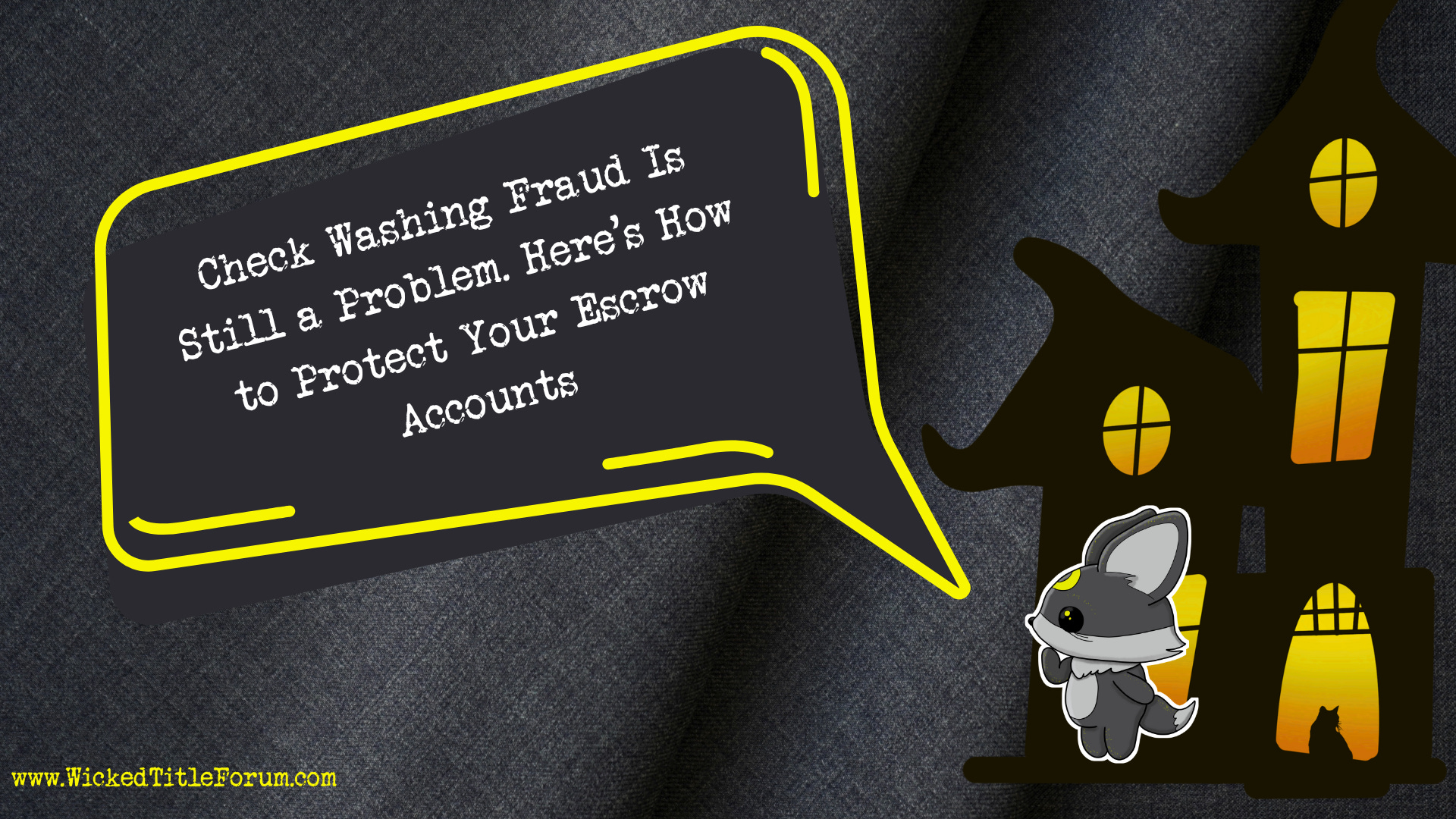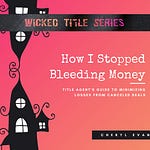🐐 Join Community | 🔔 Subscribe | 🛒 Shop Easy Kits / Merch | 📢 Be a Sponsor
As a title agent, you manage large sums of client money—and that makes your escrow account a prime target for an old but still easy and common form of fraud: Check washing.
🧼 What is Check Washing?
Check washing is an old-school scam with a modern resurgence. Criminals steal outgoing mail (especially business checks), use chemicals to erase the payee and dollar amount, and rewrite the check to themselves—for thousands more than originally issued.
They then deposit the altered check before you even know it’s gone.
🚨 Why It’s a Big Deal for Title Agents
Escrow funds are high-dollar and often time-sensitive
One fraudulent check can jeopardize multiple closings
Many title agents still rely on manual check processes
Your reputation—and ALTA Best Practices compliance—are on the line
Here is what some title agents recently had to say about check washing fraud:
Well, today I mailed off my paperwork for the case against the person who washed one of my escrow checks and deposited into their own account. Finally, it happened last July. Hope they prosecute to the fullest. If they get a slap on the wrist, they will only do it again but be smarter about it. Chances are this wasn’t their first trip to this kind of rodeo. - J.D.
We just had it happen to us…we think someone either broke into the post office box or someone at the post office did it. Luckily positive pay caught it, and it did not go through. - D.M.
We had the same a couple of years ago. I believe it was copied somewhere in the postal service as we were able to identify the exact check that was washed, and the person it was being mailed to received it and cashed it. Thank goodness for positive pay as they tried it about 30 times. We caught them all. - K.H.
I have been through this and they don’t get the punishment they deserve. - S.A.
Been there. My bank teller caught it before the positive pay did. Went to court and they got 6 months for being a repeat offender. - S.B.
Police did nothing when I sent them proof of someone who did that to 5 checks taken from my outgoing mailbox and then tried to ach their rent from my account. They said they could not prove which person in the apartment did it. -D.M.
18 years ago a former employee did this to us and 3 other firms and other firms didn’t prosecute so we had no idea about her. Eventually it caught up. We and the most recent company still within statute of limitations went after her. Had a dozen charges of check fraud. She was set to serve a year when she got pregnant right before her jail sentence was to begin and the govt let her out early on good behavior after 3 months. She paid restitution in full for about 3-4 years. Her “wrap sheet” which was literally a mile long was predominately filled with toll road violations. #neverforget - T.S.
I had that happen to me as well. Don’t know if they were ever punished or not. I now have positive pay. fortunately I didn’t lose anything because my bank caught it in time. - D.M.
When it happened to us, the DA made us be there as a victim. Prepare for them to get a slap on the wrist. - A.M.
Wicked Title Forum is a reader-supported publication. To receive new posts and support my work, consider becoming a free or paid subscriber.
🐐 Join Community | 🔔 Subscribe | 🛒 Shop Easy Kits / Merch | 📢 Be a Sponsor
🔒 The Solution: Positive Pay
Positive Pay is a fraud prevention service offered by most commercial banks. It works like this:
You send your bank a list of all issued checks (check number, payee, and amount).
When a check is presented for payment, the bank verifies it against your list.
If something doesn’t match—the bank rejects the check.
It's simple. It’s powerful. And if you're not using it, you're at risk.
✅ What You Should Do Today:
Ask your escrow bank if they offer Positive Pay (most do).
Call your software vendor. Find out if they have integration with your bank to facilitate positive pay - most do
Enable it for all outgoing checks—immediately.
Train your team on proper check handling and mail procedures.
Buy a new pen. Folks, I told you this was easy. Black gel pens are more difficult to wash off because the ink binds with the paper fibers.
Other fraud prevention steps you should be thinking about:
Make sure you're purchasing check paper with security features. This is one no one ever talks about. Not all checks are created equal. Personally, I've been doing business with ASAPChecks for over 20 years and I recommend them to all of my title clients.
Consider moving to wires when possible—less paper, more control.
Consider working with a payment processing & fraud detection firm like Rynoh, ClosingLock or CertifID.
While you're at it, check out the Wire Fraud Prevention Kit available in the Wicked Easy Shop.
🧠 Fraud isn’t just a possibility—it’s an inevitability if you’re not prepared.
Adding Positive Pay is one of the easiest, most effective ways to protect your escrow account—and your clients' trust.
Stay Wicked,
Cheryl
If you enjoy my writing, please support me with a clap, comment, follow, or subscribe.
🐐 Join Community | 🔔 Subscribe | 🛒 Shop Easy Kits / Merch | 📢 Be a Sponsor
**DISCLAIMER**
The Wicked Title Forum is a crowd-sourced resource. To help us keep our information current and correct, please comment below with any corrections or updates and we will update the article accordingly.
All sample forms should be carefully reviewed for federal & state regulatory and underwriter compliance.
The information provided here (including, but not limited to instructions, steps, or forms) is for general guidance and educational purposes only. I am not an attorney and am not giving legal advice. Information should not be considered legal, underwriting, or financial advice and is followed at your own risk. Readers should consult with their attorney and/or underwriter to obtain advice tailored to their specific circumstances.















